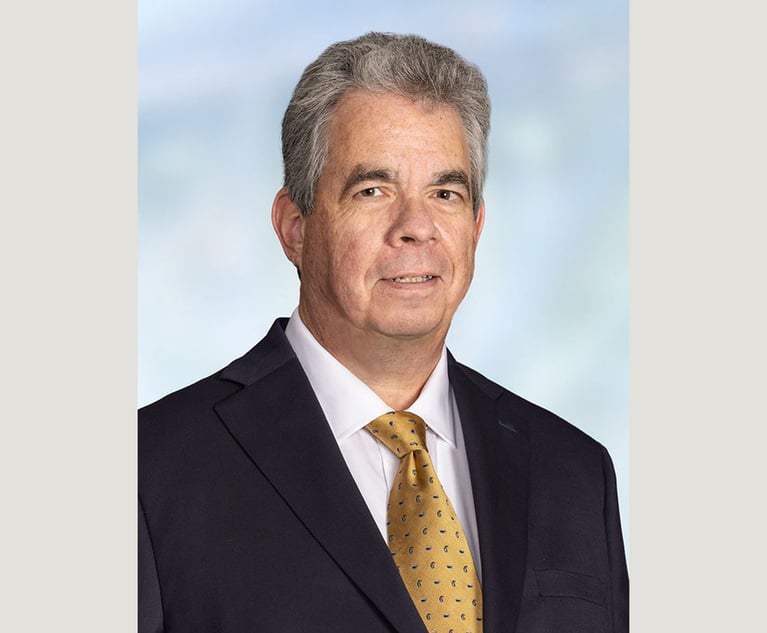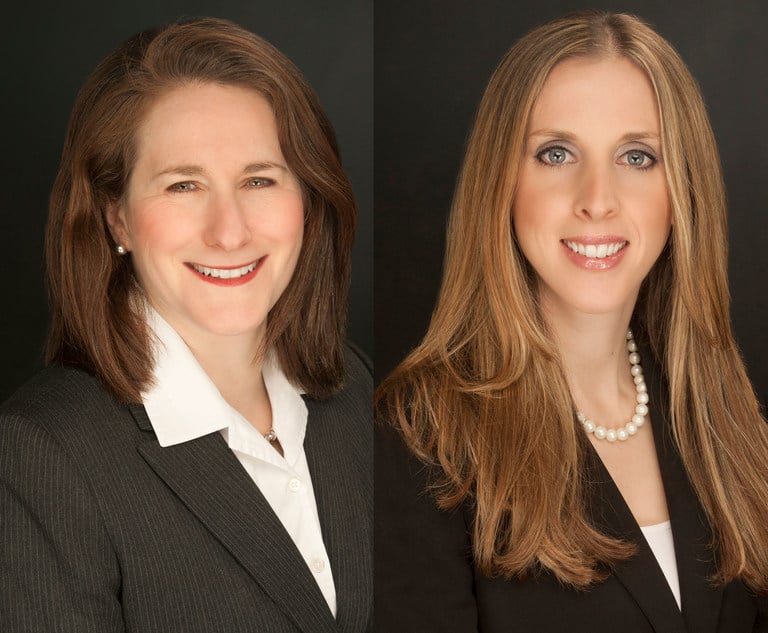When Belonging Can Cost You Everything: Affinity Fraud
So, what is affinity fraud? The Securities and Exchange Commission (SEC) defines affinity fraud as "investment scams that prey upon members of identifiable groups, such as religious or ethnic communities, the elderly or professional groups.
November 19, 2019 at 01:26 PM
7 minute read
 Nicole McNeil Donecker of Marcum LLP.
Nicole McNeil Donecker of Marcum LLP.
It sounds odd, but I had experience with "affinity fraud" before I knew what it was called. As a forensic accountant I conducted investigations involving members of religious organizations where one member of the group was preyed upon by another member for financial gain—the proverbial "I have an investment deal for you." Unfortunately, the "investment" was not as advertised, resulting in losses to many participants/"investors."
So, what is affinity fraud? The Securities and Exchange Commission (SEC) defines affinity fraud as "investment scams that prey upon members of identifiable groups, such as religious or ethnic communities, the elderly or professional groups. The fraudsters who promote affinity scams frequently are—or pretend to be—members of the group. They often enlist respected community or religious leaders from within the group to spread the word about the scheme by convincing those people that a fraudulent investment is legitimate and worthwhile."
As with other fraud schemes, perpetrators of affinity frauds take advantage of the "trust and friendship that exists in groups of people who have something in common." Victims of these types of scams often do not report the fraud to law enforcement or pursue other legal avenues; instead members try to "work things out within the group."
Affinity fraud most often involves a Ponzi or pyramid scheme that necessitates the fraudster's continual need for new investor funds in order to provide "returns" to earlier investors. The most famous of affinity frauds is Bernie Madoff's $50 billion Ponzi scheme. Madoff's victims were comprised of wealthy members of the Jewish community, Jewish organizations and charitable groups.
Affinity fraud can be investigated as either a civil or criminal matter, with complaints filed by the SEC and the Department of Justice, for example. Often the SEC's involvement is due to the utilization of unregistered securities and investments.
In April 2015, the SEC filed a civil complaint against Leroy Brown Jr. and LB Stocks and Trades Advice. Brown is a former member of the U.S. Army, living in Killeen, Texas, the same town as Fort Hood Military Base. Brown used his tenure in the military to target current and former U.S. military members. Brown and LB Stocks made numerous false statements regarding investment licenses and registrations with applicable government entities. The complaint states that Brown and LB Stocks claimed to "provide investment services for U.S. military and other government personnel, such as 'Military Deployment and Redeployment Investment Solutions' and 'Low Income Family Advice'."
Brown and LB Stocks "guaranteed" to double or triple the investment in 120 days. Investors could purchase a membership certificate of LB Stocks for $1,000 per certificate. Brown and LB Stocks purported to invest in underdeveloped land which, upon sale, would double investors' money. In the end, Brown had transferred nearly all of the investor funds into personal accounts. The SEC obtained a temporary restraining order and an asset freeze against Brown and LB Stocks. The SEC complaint seeks civil penalties, disgorgement of ill-gotten gains and permanent injunctive relief.
In March 2016, the Department of Justice filed a criminal complaint against Seng Xiong. Xiong perpetrated an affinity fraud scheme that allegedly promised Hmong elders "10 acres of land, a house and many other benefits in a future country that would be established as a Hmong homeland somewhere in Southeast Asia." Xiong, a member of the Hmong community who immigrated to the United States from Laos at a young age, was active in Hmong advocacy groups in his community in the early 2000s. According to court documents, beginning in 2012, Xiong represented to the Hmong community that he was "working with the United Nations and the United States government to establish a new country for the Hmong in South East Asia." The Hmong community in the United States was eager to return to their home and re-establish their pre-Vietnam War life.
Xiong instructed Hmong elders to deposit $3,000 to $5,000 into an account in the name of Seng Xiong through a "returning home registration form." These deposits were made to Xiong's account from bank branches in Minnesota, Wisconsin and California. Xiong reached the Hmong community through a conference call line, YouTube channel, a radio broadcast, a website and a personal cellphone number. Xiong was sentenced to 87 months in prison and three years supervised release and was ordered to pay $1,226,446 in restitution to victims.
Affinity fraud occurs throughout the United States. According to the FBI, Utah has one of the highest rates of white-collar crime in the country. In an article posted by the FBI on Dec. 18, 2017, Special Agent Michael Pickett stated that the FBI is investigating more than $2 billion of fraud in Utah, with 10 new cases opened in the previous four months.
As the SEC's definition of affinity fraud includes religious communities, it is no surprise that Utah reportedly has one of the highest rates of fraud in the United States. With over 50% of the population of Utah belonging to The Church of Jesus Christ of Latter-day Saints, the members of the church are often victims of affinity fraud. The church's website offers resources for its members including multiple articles on the topic.
Utah has become proactive in the fight against affinity fraud and other financial fraud schemes. In 2016, Utah introduced the first-of-its-kind White Collar Crime Offender Registry. An individual who has been convicted in a Utah state court after Dec. 31, 2015, of a second degree felony under eight sections of the Utah Code, including securities fraud, is required to register. The White Collar Crime Registry is part of Stop Fraud Utah, a collaborative initiative between multiple federal and state agencies offering free consumer education seminars to help residents recognize and avoid financial fraud schemes.
The SEC has issued educational materials to assist investors in recognizing affinity fraud and protecting themselves against it. The SEC.gov and Investor.gov websites contain alerts and bulletins on affinity fraud. Additionally, the SEC's Office of Investor Education and Advocacy (OIEA) provides a guide titled "Stopping Affinity Fraud in Your Community, How to avoid investment scams that target groups" to help investors avoid and recognize affinity fraud in their community.
The bulletin includes a graphic from the FINRA Investor Education Foundation identifying five common persuasion tactics used. These red flags should alert investors to either avoid the investment or perform additional research and due diligence before investing:
- The "phantom riches" tactic, which holds the potential of wealth and guaranteed income in front of the investor.
- The "source credibility" tactic, where the fraudster puts themselves out there as being with a big firm, having specialized credentials or having specific experience.
- The "social consensus" tactic, leading the victim to believe that the fraudster, their relatives and their community are also investing.
- The "reciprocity" tactic, where the fraudster will do the victim a favor in return for the investment.
- The "scarcity" tactic, which makes the investment appear exclusive or limited in supply.
When an investment seems "too good to be true" or the investment has little risk but a high return, the SEC recommends the following rules of thumb:
- No risk means low investment returns.
- High potential investment returns typically means high risk.
- Promises of consistent double-digit investment returns are consistently frauds.
Remember, do research when investing and perform due diligence on the person offering the investment. The SEC and other agencies offer resources to help investors protect themselves from scams and frauds. If it seems too good to be true, it probably is.
Nicole McNeil Donecker is an advisory services manager in the Philadelphia office of Marcum LLP, a national accounting and advisory firm with offices in major business markets throughout the United States, as well as overseas. Contact her at [email protected].
This content has been archived. It is available through our partners, LexisNexis® and Bloomberg Law.
To view this content, please continue to their sites.
Not a Lexis Subscriber?
Subscribe Now
Not a Bloomberg Law Subscriber?
Subscribe Now
NOT FOR REPRINT
© 2025 ALM Global, LLC, All Rights Reserved. Request academic re-use from www.copyright.com. All other uses, submit a request to [email protected]. For more information visit Asset & Logo Licensing.
You Might Like
View All
Former Perkins Coie Partner Moves to Stradley Ronon in Chicago

Proskauer Rose Investment Management Trio Jumps to Stradley Ronon


Stradley Ronon Bolsters Investment Management Practice With Vanguard Hire
4 minute readTrending Stories
- 1Some New Twists and Old Tricks for an Ethical New Year
- 2TikTok Hit With California Class Action for Allegedly Mining Children's Data Without Parental Consent
- 3New York Latest to Adopt NextGen Bar Exam
- 4People in the News—Jan. 9, 2025—Rawle & Henderson, Armstrong Teasdale
- 5Thinking Outside the RFP: AI’s Impact Beyond Scaling Review Efficiency
Who Got The Work
Michael G. Bongiorno, Andrew Scott Dulberg and Elizabeth E. Driscoll from Wilmer Cutler Pickering Hale and Dorr have stepped in to represent Symbotic Inc., an A.I.-enabled technology platform that focuses on increasing supply chain efficiency, and other defendants in a pending shareholder derivative lawsuit. The case, filed Oct. 2 in Massachusetts District Court by the Brown Law Firm on behalf of Stephen Austen, accuses certain officers and directors of misleading investors in regard to Symbotic's potential for margin growth by failing to disclose that the company was not equipped to timely deploy its systems or manage expenses through project delays. The case, assigned to U.S. District Judge Nathaniel M. Gorton, is 1:24-cv-12522, Austen v. Cohen et al.
Who Got The Work
Edmund Polubinski and Marie Killmond of Davis Polk & Wardwell have entered appearances for data platform software development company MongoDB and other defendants in a pending shareholder derivative lawsuit. The action, filed Oct. 7 in New York Southern District Court by the Brown Law Firm, accuses the company's directors and/or officers of falsely expressing confidence in the company’s restructuring of its sales incentive plan and downplaying the severity of decreases in its upfront commitments. The case is 1:24-cv-07594, Roy v. Ittycheria et al.
Who Got The Work
Amy O. Bruchs and Kurt F. Ellison of Michael Best & Friedrich have entered appearances for Epic Systems Corp. in a pending employment discrimination lawsuit. The suit was filed Sept. 7 in Wisconsin Western District Court by Levine Eisberner LLC and Siri & Glimstad on behalf of a project manager who claims that he was wrongfully terminated after applying for a religious exemption to the defendant's COVID-19 vaccine mandate. The case, assigned to U.S. Magistrate Judge Anita Marie Boor, is 3:24-cv-00630, Secker, Nathan v. Epic Systems Corporation.
Who Got The Work
David X. Sullivan, Thomas J. Finn and Gregory A. Hall from McCarter & English have entered appearances for Sunrun Installation Services in a pending civil rights lawsuit. The complaint was filed Sept. 4 in Connecticut District Court by attorney Robert M. Berke on behalf of former employee George Edward Steins, who was arrested and charged with employing an unregistered home improvement salesperson. The complaint alleges that had Sunrun informed the Connecticut Department of Consumer Protection that the plaintiff's employment had ended in 2017 and that he no longer held Sunrun's home improvement contractor license, he would not have been hit with charges, which were dismissed in May 2024. The case, assigned to U.S. District Judge Jeffrey A. Meyer, is 3:24-cv-01423, Steins v. Sunrun, Inc. et al.
Who Got The Work
Greenberg Traurig shareholder Joshua L. Raskin has entered an appearance for boohoo.com UK Ltd. in a pending patent infringement lawsuit. The suit, filed Sept. 3 in Texas Eastern District Court by Rozier Hardt McDonough on behalf of Alto Dynamics, asserts five patents related to an online shopping platform. The case, assigned to U.S. District Judge Rodney Gilstrap, is 2:24-cv-00719, Alto Dynamics, LLC v. boohoo.com UK Limited.
Featured Firms
Law Offices of Gary Martin Hays & Associates, P.C.
(470) 294-1674
Law Offices of Mark E. Salomone
(857) 444-6468
Smith & Hassler
(713) 739-1250





